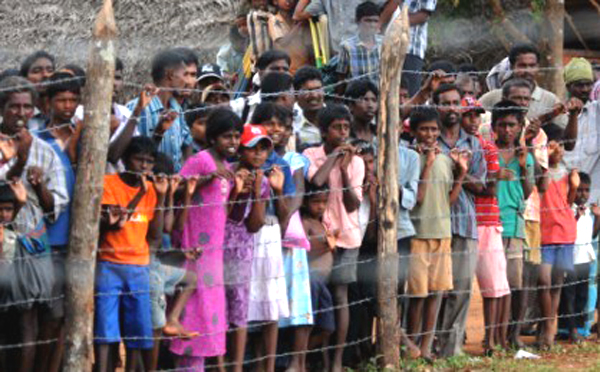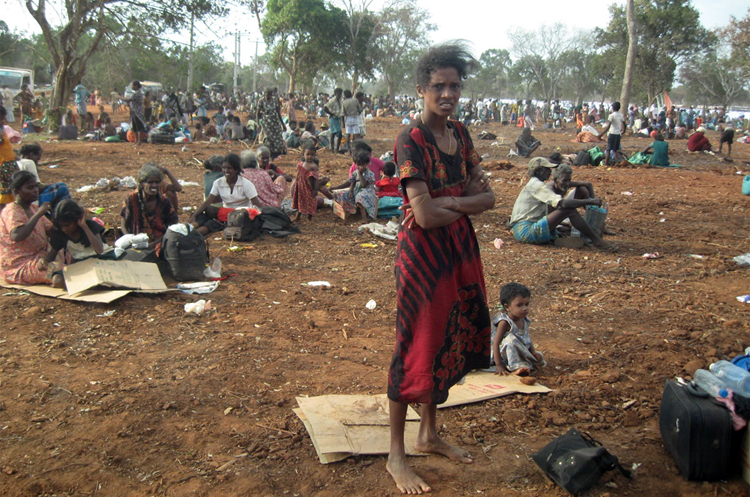-
UN Security Council Press Statement, 13 May 2009 - "A Wake up
Call"
 Text of Statement
Text of Statement
 Report by Huffington Post
Report by Huffington Post
Comment by
tamilnation.org
It appears that what we wrote nearly 4
months ago on 29 January 2009 in
Sinhala Sri Lanka's Genocide of Eelam Tamils - a Crime Against
Humanity,
has now come to
pass -
"...the
international community will wait till Tamil resistance is
sufficiently weakened or annihilated before it
attempts to intervene 'on humanitarian grounds' and in seeming
response to 'world wide Tamil appeals'. Meanwhile the IC
will even welcome such world wide appeals by Tamils as that will
pave the way (and establish useful contact points amongst the
Tamil diaspora) for IC's eventual intervention with 'development
aid' with the mantra of not conflict resolution but 'conflict
transformation'.Give them cake when they ask for freedom
from alien Sinhala rule. A conquered people should be grateful
for whatever they can get - though there may not be not enough
cake to go round. The Tamil people are being taught the truth of
something which
Subhas
Chandra Bose
said many years ago - Freedom is not given, it is taken... "
We said it again
three months ago in
The Politics of Humanitarian Intervention,
24 February 2009 -
'Humanitarian
intervention' to prevent the humanitarian tragedy that is
taking place in the Tamil homeland, had it been early,
would have been kind. But the belated attempts that are
being made today expose not the humanitarian concerns of the
international actors but the strategic interests that impel
the international actors to act the way they do.
After all the simplest
thing that the international actors could have done to
protect the Tamil people would have been to remove the ban
on the LTTE so that the capacity of the people of Tamil
Eelam to resist the genocidal onslaught launched on them by
Sinhala Sri Lanka may have been strengthened. The simple and
humane thing that the international actors could have done
was
not to taunt the struggles against terrorism with the label
terrorism
but to adopt a principle centered approach which
liberated political language and also helped to liberate a
people who have
taken up arms as
a last resort in their
struggle for freedom from oppressive alien Sinhala rule.
.."
Predictably, the
UN Security Council has called upon the LTTE to "allow
the tens of thousands of civilians still in the conflict zone to
leave". If not for the humanitarian tragedy faced by the
people of Tamil Eelam caused by the
genocidal onslaught by Sinhala Sri Lanka, the UN Security
Council suggestion that but for the LTTE, Tamil civilians would
some how want to voluntarily leave the conflict zone to go into
barbed wire concentration camps would be laughable.


Wije Das was right to point out in
Army�s war crimes
continue in northern Sri Lanka on 13 May 2009
"..The army�s attacks on
hospitals and other civilian targets are not accidents but part
of a strategy of terrorising the population inside the remaining
LTTE territory. The aim is to stampede civilians into leaving
the area so that it can be turned into a free fire zone.."
And we said in our
Open Letter
to US Secretary of State Hillary Clinton on 6 April 2009 -
"Genocides
do not just happen.. Mao Tse-tung's
famous dictum that the guerrilla moves amongst the people as a
fish swims in the sea has brought with it the counter guerrilla
strategy of draining the sea....
You will recall that it was a strategy which was spelt out with
candour by US supported Guatemala Gen. Efrain Rios Montt in the
1980s - "The guerrilla is the fish. The people are the sea.
If you cannot catch the fish, you have to drain the sea."
.... It is unfortunate that
the US policy that you have adumbrated in your letter
labels the 'sea' in which the guerrilla swims as a 'human
shield' and appears directed to help draining the sea by
evacuating the Tamil civilian population from their homeland in
the Vanni to camps - albeit supervised/overseen by the
international community so that the US and the 'international
community' (presumably not including China and/or Iran and/or
even India) may secure their own physical presence in the
island, through international NGOs and/or the United States
Pacific Command...
I have tried to understand the reasons
for your denial of the justice of the struggle of the
people of Tamil Eelam for an independent state - an
independent state which may associate on equal terms and in
freedom with an independent Sinhala Sri Lankan state. I am
driven to the conclusion that it is the dynamics of the balance
of power in the Indian Ocean region that leads you to give your
support to the continued existence of an undivided Sri Lanka.
It appears that you are concerned that support for an
independent Tamil Eelam may lead to an increased Chinese/Iranian
presence in Sinhala Sri Lanka and in the Indian Ocean region. At
the sametime, you will recognise that a 'post genocide' Sri
Lanka will prove to be no different to Saddam Hussien's Iraq
which the US supported in Iraq's war against Iran..."
The UN Security Council Press
Statement (not Resolution) reflects the horsedealing that went on
before unanimity was found and the real politick nature of its
deliberations behind the pretensions of humanitarian concern -
"Russia, China, Libya and Vietnam
had opposed putting the issue on the agenda of the Security
Council, the U.N.'s most powerful body, considering the war an
internal matter rather than a threat to international peace and
security. But they relented in issuing a statement after the
Western council members agreed to discuss a U.N. report on
Israel's war in January in Gaza that the United States and its
allies did not want raised, diplomats said. The council
issued a brief press statement, shorter than the one on Sri
Lanka, expressing concern about the report's findings, which
were critical of Israel."
Report by
Huffington Post, 14 May 2009
And as for the actions of the so
called Western Council members, Wije Das was again right to
point out in
Army�s war crimes
continue in northern Sri Lanka on 13 May 2009 -
"...The US, France and Britain
have been issuing hypocritical expressions of concern about the
humanitarian crisis, but all these powers quietly backed
Rajapakse�s decision to plunge the country back to war in
mid-2006. Their calls for a ceasefire are not issued out of
concern for the trapped civilians, but to shape the outcome
of the war in their own economic and strategic interests.
All these powers bear their share of political responsibility
for the Sri Lankan government�s communal war and
the war crimes being carried out."
The UN Security Council Press
Statement will provide a wake up call to those in the Tamil diaspora
who sought to rely on the 'humanitarian concerns' of the
international community to secure freedom and justice for the people
of Tamil Eelam.
We have said it before and
we say it again. There are two ongoing conflicts in the
island of Sri Lanka. One is the conflict between a Sinhala
nation masquerading as a Sri Lanka 'civic'
nation and a
Tamil Eelam nation
seeking freedom from alien Sinhala rule. The other is the
conflict between the trilaterals (US, EU, and Japan), India and
China in the Indian Ocean region. The harsh political reality is
that each of the three international actors seek to resolve the
Sinhala/Tamil conflict in such a way that embeds their own
presence in the island of Sri Lanka.
The Tamil people
are being taught the truth of something which
Subhas Chandra
Bose said many years ago - Freedom is not given, it is taken.
Stephen Covey was right when he declared:
'Borrowing strength builds weakness. It builds
weakness in the borrower because it reinforces dependence on
external factors to get things done. It builds weakness in the
person forced to acquiesce, stunting the development of independent
reasoning, growth and internal discipline. And finally it builds
weakness in the relationship. Fear replaces cooperation, and both
people involved become more arbitrary and defensive... ' 'Thongura'
power is no power. It builds weakness, stunts independent growth and
replaces cooperation with fear. And those who may be seduced by
'thongura power' will find the words of
Sri Aurobindo
helpful -
"Our appeal, the appeal of every
high souled and self respecting nation, ought not to be to the
British sense of justice, but to our own reviving sense of
manhood, to our own sincere fellow feeling - so far as it can be
called sincere - with the silent suffering people of India. I am
sure that eventually the nobler part of us will prevail, -
that when we no longer obey the dictates of a veiled
self interest, but return to the profession of a large and
genuine patriotism, when we cease to hanker after the soiled
crumbs which England may cast to us from her table, then it will
be to that sense of manhood, to that sincere fellow feeling that
we shall finally and forcibly appeal."
In Tamil Eelam today, though the
charge is genocide, the struggle is for freedom.
 Text of Statement
Text of Statement
The following Security Council press statement on Sri Lanka was read out
today by Council President Vitaly Churkin ( Russian Federation):
The
members of the Security Council express grave concern over the worsening
humanitarian crisis in north-east Sri Lanka, in particular the reports
of hundreds of civilian casualties in recent days, and call for urgent
action by all parties to ensure the safety of civilians.
The members
of the Security Council strongly condemn the Liberation Tigers of Tamil
Eelam (LTTE) for its acts of terrorism over many years, and for its
continued use of civilians as human shields, and acknowledge the
legitimate right of the Government of Sri Lanka to combat terrorism.
The members of the Security Council demand that the LTTE lay down its
arms and allow the tens of thousands of civilians still in the conflict
zone to leave.
The members of the Security Council express deep
concern at the reports of continued use of heavy calibre weapons in
areas with high concentrations of civilians, and expect the Government
of Sri Lanka to fulfil its commitment in this regard.
The members of
the Security Council demand that all parties respect their obligations
under international humanitarian law.
The members of the Security
Council call on the Government of Sri Lanka to take the further
necessary steps to facilitate the evacuation of the trapped civilians
and the urgent delivery of humanitarian assistance to them.
The
members of the Security Council take note of the steps taken by the
Government of Sri Lanka to address the humanitarian situation of
displaced persons and call on the Government of Sri Lanka to ensure the
security of those displaced by the conflict and to cooperate with the
United Nations, the International Committee of the Red Cross (ICRC), and
other international humanitarian organizations in providing humanitarian
relief and access to them as soon as they leave the conflict zone.
The
members of the Security Council reiterate support for the personal
involvement of the UN Secretary General and urge the Government of Sri
Lanka to extend full cooperation to the United Nations in order to
resolve the humanitarian crisis.
The members of the Security Council,
mindful of the necessity to find a long-term solution without the threat
of violence, underline that the needs of all communities in Sri Lanka
have to be addressed.